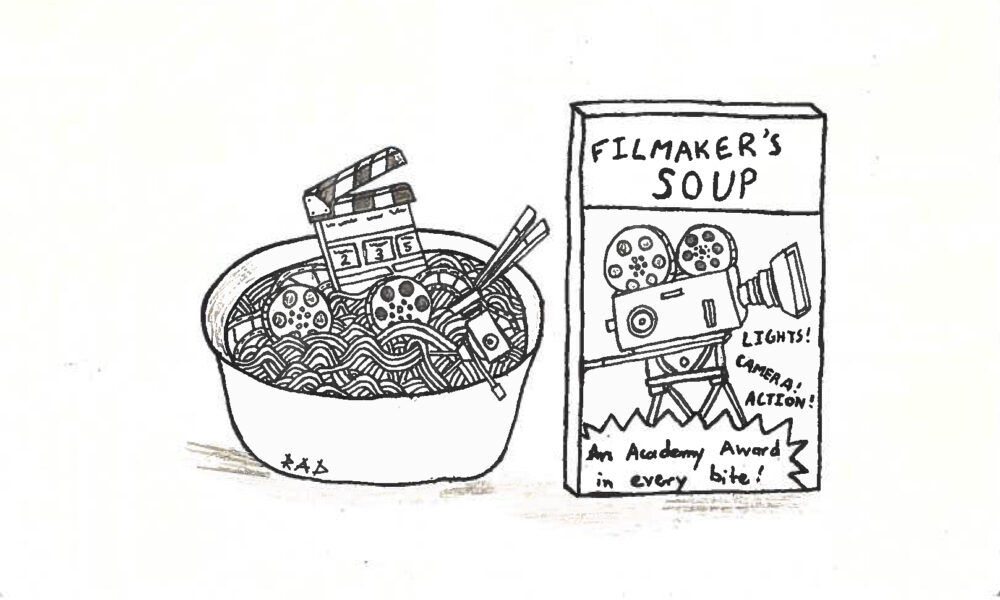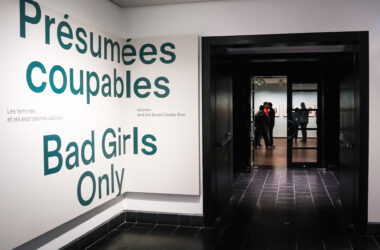On the evening of Oct. 28, Peterson Hall was filled with warmth, warmed by yellowed lamps inside Critical Media Lab’s bookshelf-lined screening room, warmed by cheerful conversation, and warmed by soup.
Attendees had gathered for Soup and Memory, a two-night film series bringing together food and film, screening documentaries by Asian women filmmakers and serving soup made by community chefs. Miao Collective—a group that seeks to showcase films from emerging filmmakers to local audiences, focusing on Asian creators—organized the event series with support from McGill’s Critical Media Club and funding from the Canadian Race Relations Foundation.
On one side of the room, Miao Collective organizers spooned out bowlfuls of Indonesian chicken curry and snow fungus soup to eager attendees. On the other side, those already served chatted, tucking into their Tupperware containers and red solo cups.
After having eaten, attendees filed into the Critical Media Lab and waited for the documentary screenings to start.
Audrey Jiang, Curator and Director of Miao Collective, began by explaining that the event’s theme speaks to the way soup can act as a site for community building and a reminder of ancestral knowledge. Jiang told The Tribune that she first conceived of the event after reflecting on her own experiences with food as a member of the Asian diaspora living in North America.
“It’s through my interaction with other cultures that I realized […] how food is important to my digestive system, my body, and my memory,” Jiang said. “After I realized this, I found a lot of memories that are really dear to my heart [and] are always related to food. I always wanted to do something related to diasporic film and diasporic food [as] it can bring people together to have communal healing together.”
Shirley Soh’s Remember, to Eat took to the screen first. The short documentary showcases four senior residents of a Singapore public rental housing neighbourhood as they cook their favourite recipes, exploring the memories and community ties that form around food.
Attendees then watched Cavebirds by Emily Gan. The film follows her father’s efforts to build a birdhouse for swiftlets in Mengkarak, Malaysia in the hopes of harvesting their nests, which are used to make bird’s nest soup. Following the screening, Gan and the attendees discussed her practice as a filmmaker and the documentary’s reflections on memory and family in a Q&A session.
In an email to The Tribune, Gan highlighted that she journaled frequently while working on the film, and many memories of family meals arose from this.
“Half-quoting from my film, […] I realized that food very much serves as an expression of love and care—a way to nurture, provide, offer, and share,” Gan wrote. “Food awakens our senses, and through them, it can evoke memories, transporting us to different times and places.”
However, Gan noted that bird’s nest soup is a luxury food that stands in contrast to ideas of soup as a comfort food. In Cavebirds, it is this soup that “came to represent an imagined legacy [Gan’s father] wished to pass down.”
For event attendee Dorothy Lok, the documentaries served as an important reminder of the intentionality that goes into cooking and the ties that it creates, something that busy students can easily forget.
“Looking at these films reminded me of how food can be communal, and also my memories with food are so much more than just trying to sustain myself physically,” Lok said. “They’re also with my family and with the people around me.”
Jiang explained that one motivation for serving soup before the screenings was to encourage attendees to engage with one another and with the documentaries. Jiang—who plans on publishing the recipes for the soups on their Instagram—hopes that the dishes will be a way for attendees to retain and return to their experiences watching the films.
“If you get sick, if it’s windy, it’s a snowy day, you’re home, you have chicken, maybe you can cook the same soup, and think of the warmth and depths you felt from the films.”
This article was updated on Dec. 5, 2024.









